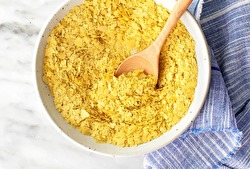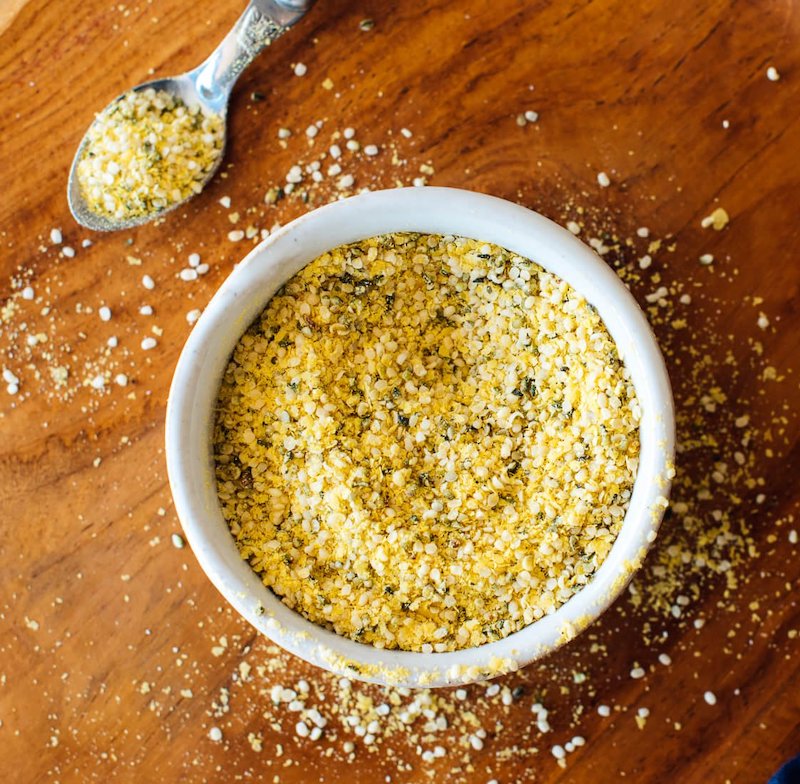
Nutritional yeast is a deactivated form of Saccharomyces cerevisiae. Unlike active yeasts used in baking, nutritional yeast is heat-treated and dried, making it inactive and giving it a nutty, cheesy flavor and flaky texture. It is cultivated specifically to be rich in vitamins and minerals, making it a valuable addition to any diet, especially for those following plant-based or vegan diets.
Nutritional Profile
- Protein
Amino acids, commonly known as the building blocks of protein, are broken down into essential components when you consume protein. These components are then reassembled into vital body parts, including the genes and blood. Nutritional yeast offers a complete range of amino acids, which comprise 50% of its weight. This makes it a powerful nutritional asset. - Fiber
Fiber feeds the gut microbiome, which then produces butyric acid. Butyric acid helps reduce insulin resistance. Consequently, insulin aids in regulating blood sugar levels. - Vitamins
Nutritional yeast is an excellent source of several B vitamins, specifically:- Vitamin B1 can decrease stress and increase energy.
- Vitamin B2 and Vitamin B3 are good for the skin, digestion, hair, and nails.
- Vitamin B6 is a crucial nutrient for the mitochondria to generate energy. Over time, they often deteriorate due to factors like poor diet, oxidative stress, and diseases, leaching vitality.
- It doesn’t naturally contain vitamin B12, as yeast cannot produce it. When fortified, vitamin B12 (produced only by some bacteria) is added specifically to the yeast. It is an important vitamin for supporting energy and metabolism, and its recommended form is Methylcobalamin (not Cyanocobalamin).
- Minerals
Nutritional yeast contains minerals vital for health and hair, nails, skin, and muscles in particular.- Potassium is the most important electrolyte, needed daily in large quantities.
- Magnesium ranks second after potassium as the most common electrolyte deficiency in people.
- Calcium plays a vital role in maintaining bone health. Beyond that, it’s equally important for healthy skin to generate an immune response against harmful viruses.
- Chromium enhances the function of Insulin (a fat-storing hormone) and, therefore, is excellent to help correct Insulin resistance.
- Selenium helps with Hashimoto’s disease (a thyroid auto-immune condition) and aids with mercury detox and the repair of the liver.
- Zinc is a co-factor for over 100 enzymes and helps reduce allergies, shorten the duration of a cold, and support children’s healthy growth.
- Antioxidants
Glutathione is a powerful antioxidant that helps prevent oxidation in different parts of the body. While the body does make its glutathione, consuming it additionally can help boost the neutralization of free radical damage in the body.

Health Benefits
Immune Support
Nutritional yeast offers several notable nutritional benefits, especially its ability to support immune function. Beta-glucans, naturally found in nutritional yeast, have been proven to have immune-stimulating properties. These complex sugars activate immune cells, such as macrophages, essential for defending our bodies against harmful pathogens.
Heart Health
Nutritional yeast is a rich source of beta-glucans and niacin (vitamin B3), crucial for cardiovascular health. Beta-glucans have been shown to enhance HDL cholesterol levels and lower LDL cholesterol. Although nutritional yeast should not replace medical advice, incorporating it into a heart-healthy diet can contribute to improved cardiovascular health.
Healthy Pregnancy
Nutritional yeast offers numerous benefits, particularly during pregnancy. It’s an excellent source of folate (vitamin B9), which is a vital nutrient for fetal development. Ensuring adequate folate intake during pregnancy can significantly reduce the risk of neural tube defects in babies. It also supports the baby’s healthy growth and overall development. However, it’s essential to consult your doctor or healthcare professional before making any dietary changes or adding supplements, including nutritional yeast, especially during pregnancy.
Blood Sugar Management
New research indicates that chromium might positively impact insulin sensitivity and blood sugar control. Although more research is needed, these potential advantages are promising for individuals managing or at risk of developing diabetes. Incorporating nutritional yeast into meals has a positive effect on satiety, which indirectly aids in managing blood sugar levels.
Ways to Use Nutritional Yeast
- Cheese Substitute: Use it to create a vegan cheese substitute or sprinkle it on popcorn, pasta, or salads for a cheesy flavor.
- Seasoning: Enhance the flavor of roasted vegetables, soups, and pesto.
- Smoothies and Shakes: Add a tablespoon to your morning smoothie for extra protein and B vitamins.

Potential Considerations
Nutritional yeast offers numerous health benefits. However, it’s crucial to recognize and be aware of potential considerations and side effects, as with any dietary change. Some individuals may experience side effects when incorporating nutritional yeast into their diet.
- Digestive issues: High fiber content may cause bloating or gas in some individuals.
- Yeast sensitivity: Those with yeast allergies or a history of yeast infections should consult a healthcare provider before use.
- Medication interactions: As nutritional yeast contains tyramine, it can interact with certain medications like MAOIs.
- Gout concerns: Since it’s high in purines, it can exacerbate gout symptoms.
Conclusion
Nutritional yeast is a versatile and nutrient-dense ingredient that can enhance both the flavor and nutritional value of your meals. Its numerous health benefits make it a valuable addition to a balanced diet. However, it's important to introduce it gradually and consult with a healthcare provider if you have any underlying health conditions or are taking medications.
Your well-being and your nutritional choices could be significantly improved when working with a dedicated professional, conversant in existing dieting theories and familiar with the challenges you face. Improve your lifestyle and eating habits by choosing to work with your favourite nutritional health coach.
